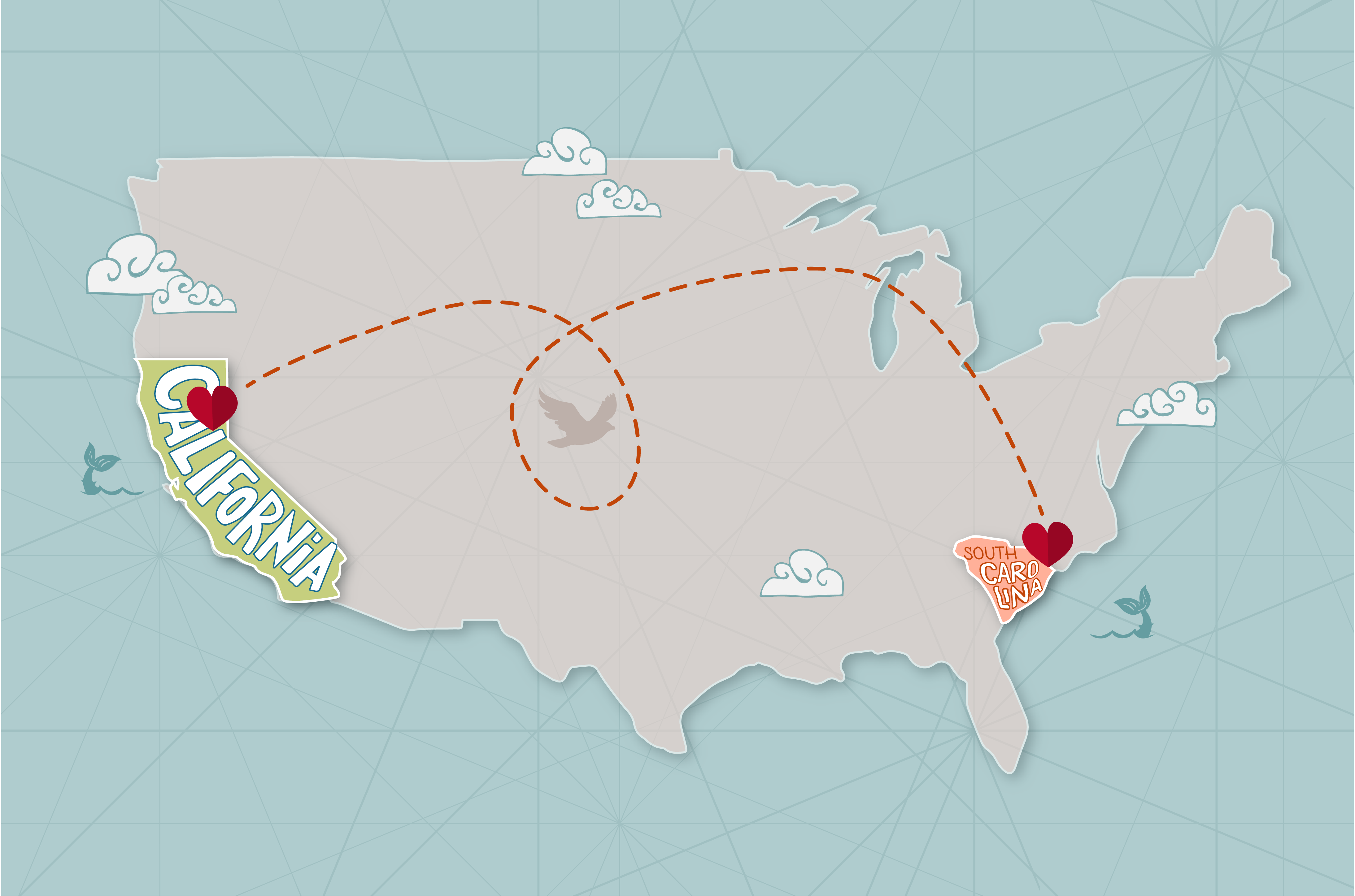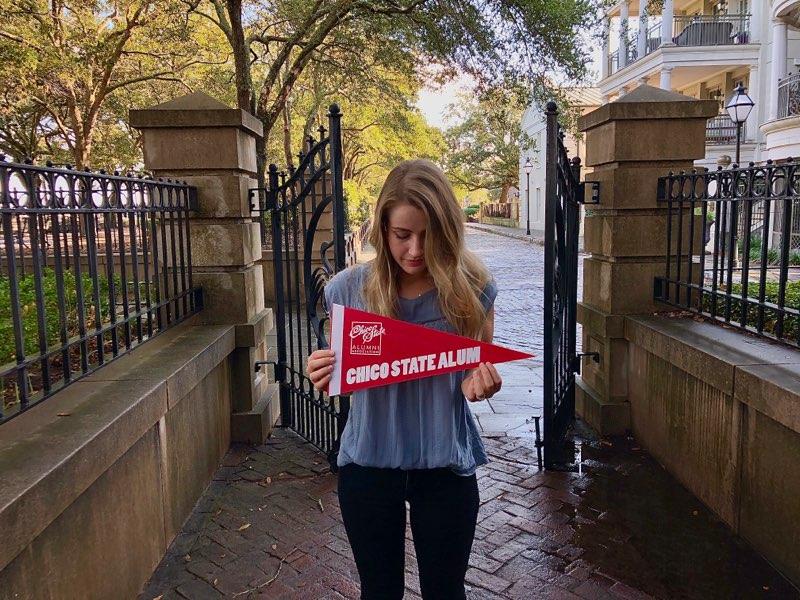One Year Later and 3,000 Miles Away

Editor’s Note: As we approach the one-year anniversary of the Camp Fire, we are honoring its impact on our community with a series of stories embracing the themes of remembrance, recovery, and resurgence.
My entire life was built between plots of almond orchards and rice fields in Northern California. I was born in Sacramento, spent my childhood in Yuba City, and started my young adulthood in Chico.
I had grown a root system within this 100-mile stretch, which made choosing Chico State a decision that felt familiar and easy. When I graduated in spring 2019 with my bachelor’s degree in English and a handful of certificates, I left with nothing short of lifelong friends, meaningful memories, and a refined hand for my field of study.
I knew I would also always carry the deeper sense of togetherness that Chico State showed me—how respect, helping hands, and love for others and the community maintains during droughts and floods of hardship.
Like many of my peers, I was halfway through my senior year when Chico’s neighboring areas—Paradise, Magalia, Concow, and others—endured the tragedy that was the Camp Fire. I can still remember walking out of my 8 a.m. class on November 8 into red air thick with smoke. Neither my fellow classmates nor I could have fathomed the cause of the bruised morning sky and the light, snowy ash that dusted the Arts & Humanities Building’s courtyard.

In the days that followed, I witnessed the Camp Fire try to swallow my community. The ensuing destruction, devastation, and the desolation that it caused was unprecedented and unbelievable. A classmate who sat behind me in my “Shakespeare” course lost her childhood home in Paradise. A coworker lost three family homes across the county to the Camp Fire’s wake. My parents’ close friends were stripped of the ability to say goodbye to their aging parents, who were among the 85 fatalities that day. I witnessed a kind of heartbreak and shock that left no one untouched.
Everywhere I looked, someone was tending a gaping wound. And at the same time, everyone was helping someone else thread their stitches toward recovery.
Four days after graduation, I packed everything I could fit into two suitcases and moved to Charleston, South Carolina, to be closer to family.
Today, almost one year after the fire and thousands of miles away from Butte County, I continue to find remnants of the devastation.
Shortly after moving to this new city, my fiancé and I sat down for breakfast in a Waffle House along the outskirts of Charleston. We talked about the Chico State shirt I was wearing while we sipped our coffee, how few people outside of California recognize my small-town University—possibly because we’re known for agriculture and teaching credentials rather than football.
A handful of minutes passed and then a woman sat down to eat breakfast alone across the restaurant. While being handed her cup of coffee, she made eye contact with me, recognized the university spelled across my shirt, then shouted, “Ma’am, are you from Chico?”
She proceeded to tell us that months earlier, while she was residing 3,000 miles away in Charleston, her parents were enduring the deadliest and most destructive wildfire in California history. Longtime Paradise residents, they had scarcely escaped the walls of fire and were among the thousands who tragically lost their homes and community. Days afterward, the couple had the opportunity to find rest and refuge through both the community’s and Chico State’s outpourings of support.
She spoke about how her parents’ time spent on Chico State’s campus was restorative and healing. She described how the spirit, energy, and community of young college students brimming with selflessness were revitalizing after enduring such trauma.
The most healing part for them was being able to share community-wide meals at Sutter Dining Hall amongst the students and fellow survivors. “Everyone was so kind and welcoming and supportive of each other,” she emphasized.

The restaurant patrons around and between us listened as our conversation bounced between the windowed walls of the small dining room. Some asked questions, sparking a restaurant-wide conversation. However, most couldn’t understand the gravity of the event we tried to explain.
How can you convey the pain, loss, and suffering of an entire county from across a Waffle House dining room?
There are 2,848 miles that stretch between Butte County and Charleston, South Carolina. I never would have thought that while sitting in a diner thousands of miles from my hometown, I can still feel the aftershocks of a shaken community on the other side of the country.
However, this encounter has been just one of many. As I continue to proudly wear my Wildcat T-shirts and share that I relocated from Chico, I’ve met people whose families or friends were affected by the Camp Fire while eating at restaurants, standing in line to buy groceries at Costco Wholesale, or at the DMV when I turned in my California driver’s license. And each time, it feels like the familiar kindness of my hometown community is always just in reach. There is something paradoxically bittersweet about tragedy that creates connections in strangers.

As we approach the one-year mark of the Camp Fire, I hope this moment in time will be regarded as a commemoration of loss but also an anniversary of triumph.
It is a celebration of the resilience of the community and a remembrance of those who were lost, displaced, and those who are still grieving. It should stand as a reminder that even the smallest acts never go unnoticed or forgotten, because from opposite corners of the United States, there are people who can still feel the pulses of love, support, and kindness that transcended the Butte County border.
As we were exchanging goodbyes with the woman in dining room, she thanked me in place of all the staff, students, and community members who shared their kindness and support while her family was going through the thickest part of their grief.
On behalf of her and countless others: thank you, Chico State and its surrounding community. Your kindness, selflessness, and support have not been forgotten. May the compassion and care you showed that day and in the months that followed never dim.


